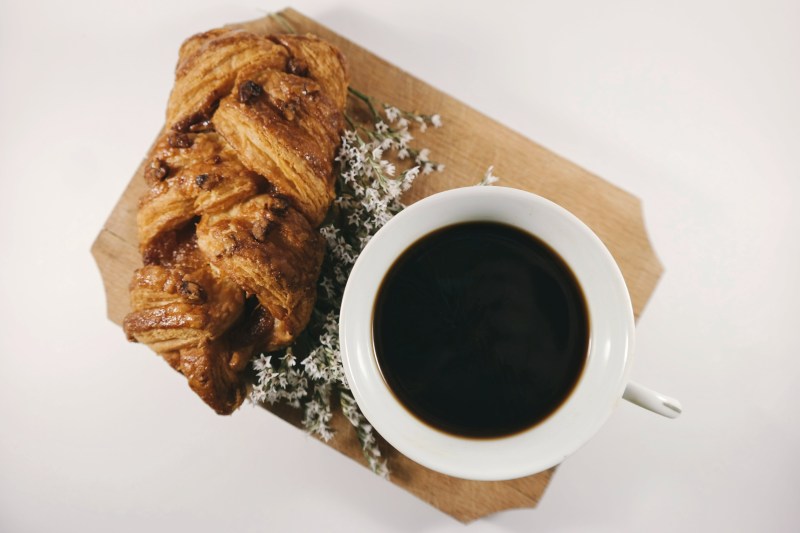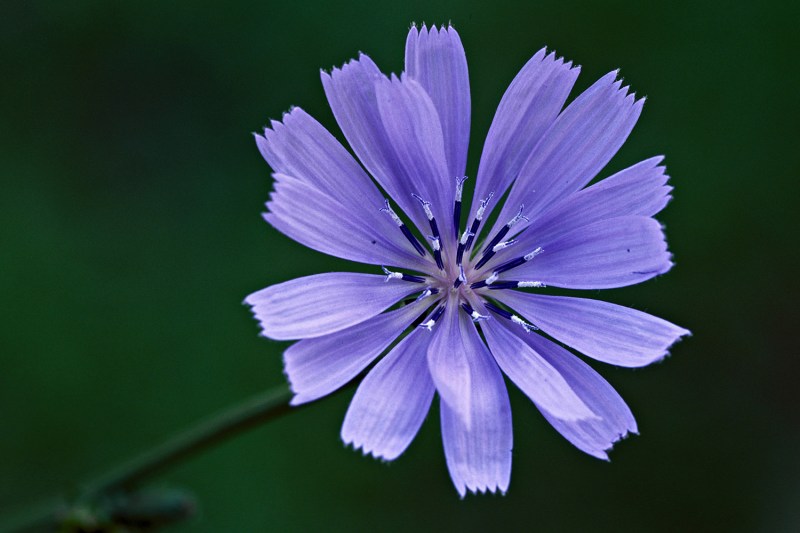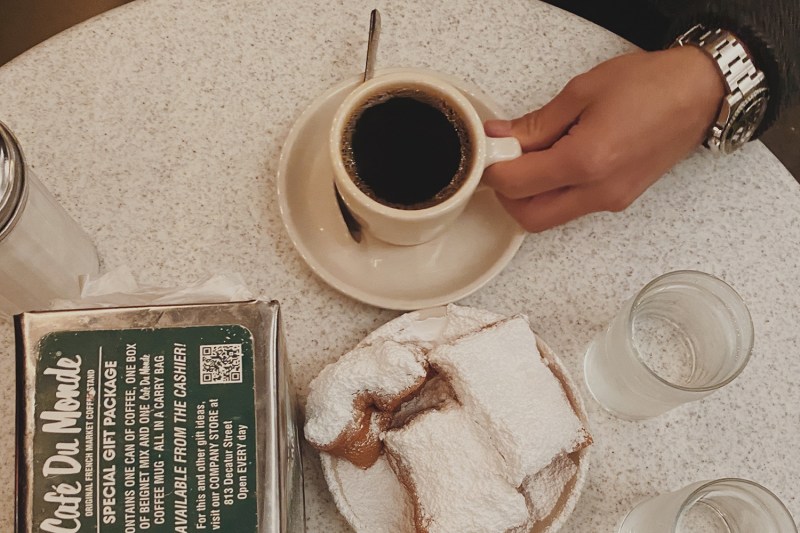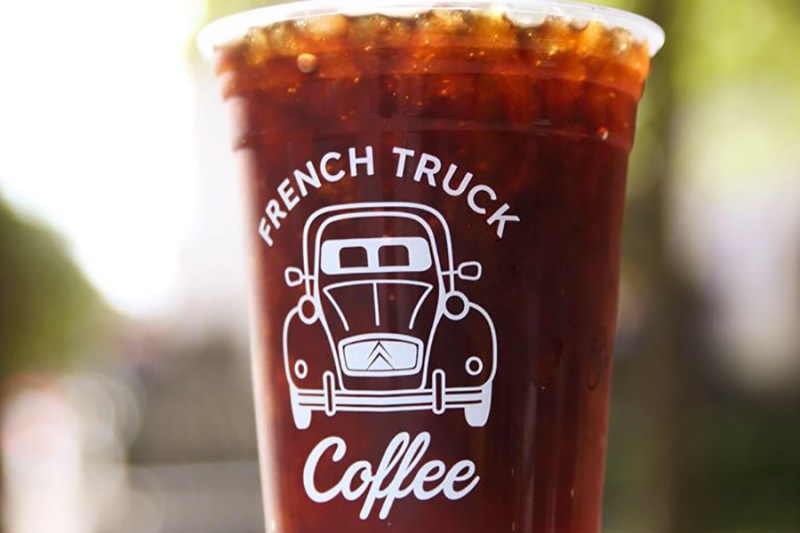
When the going gets tough, the toughest know how to ration. This culinary notion has been proven time and time again and during the grimmest stretches of wartime or the most meager hours of drought and famine.
Chicory coffee came about under such less-than-ideal circumstances and has since become an edible celebrity along the historic streets of New Orleans. Born of restrictive laws that prohibited coffee imports, chicory filled the gap. While it contains no caffeine, it does offer woodsy flavors and a mouthfeel not unlike coffee. To stretch out limited coffee supplies, folks would add chicory to the mix. Like lard, chicory had an ability to extend the lifespan of prominent pantry items.
Napoleon’s blockade in the early 1800s resulted in very small amounts of beans making landfall in France. Similar moves by the powers-that-be at the time in other parts of the world kept coffee away and citizens were, well, jonesing for some. They got creative and went with something that, at the very least, resembled coffee. In turn, chicory coffee was born.
What is chicory coffee?

Chicory is like a root vegetable, grown in France, South Africa, and increasingly stateside in places like Nebraska. A relative of Endive and a member of the dandelion family, it’s essentially a salad leaf and green snack for livestock above ground. Below ground, it contains a root system that’s dug up, cut, dried, roasted, and ground.
Egyptians found medicinal uses for chicory as far back as 5,000 years ago. In the American South, people found it extra useful amid a naval blockade during the Civil War. Locals needed their Java, even if it was an adjusted version. The trend stuck, and it wasn’t long before New Orleans residents relied on a chilled riff during the stuffier summer months, birthing the nickname “New Orleans coffee.”
The Cafe du Monde chicory coffee container is now iconic, with its orange glow and vintage print of the Jackson Square location. The containers double as silverware tins in southern-inspired eateries all over the country. Du Monde claims the chicory adds a chocolate-like flavor to the coffee, an ideal complement.
The taste of chicory coffee

At the famous New Orleans outpost, it’s typically served “au lait,” or split evenly with hot milk. It’s even better, as the cafe argues, with a plate of beignets — another New Orleans favorite. Chicory coffee may have been the child of troubled times, but it’s adored for what it stands for a link to the past and a damn decent replacement for the stuff we crave most as soon as we wake.
The rustic flavors of chicory fare excellently with bold black coffee and a cut of milk. The combo seems to sum up the French-Louisiana cultural marriage. It’s made in New Orleans today the same way it was when it first came about.
Health benefits of chicory coffee

There are health benefits, too, according to chicory’s loyal following. In the early days, it was believed to be a liver enhancer and an all-around uplifting agent. Many still think it possesses these qualities, choosing it over — or at least in ratio favor of — traditional coffee, knowing that it’s easier on blood pressure and lowers cholesterol. One of the unique things about chicory root coffee is its fiber content, with about 68% made up of inulin, a prebiotic fiber that can help support your gut health.
Consuming prebiotic fibers can help reduce inflammation and create a stronger, healthier microbiome. In turn, this can help support healthy bowel function while also allowing your GI system to more effectively absorb nutrients. In addition, the caffeine-free nature of chicory coffee is healthy for those with high cortisol who are actively trying to reduce caffeine consumption.
Chicory root coffee in New Orleans

Bobby Winston is a New Orleans native and the co-owner of French Truck Coffee. The roaster has a half-dozen coffee shops throughout Louisiana, as well as a cafe in Nashville. This coffee truck sources beans from all over the globe and prepares beans for some wholesale clients as well.
Like so many coffee producers in the Big Easy, French Truck honors the longstanding chicory tradition with its own version. Winston and his team source chicory from Nebraska and it shows up ground and roasted. They then blend it with beans from South and Central America. Winston says it’s best for the colder takes on coffee.
“We think it adds nice viscosity and sweetness to iced coffee. Most of the time, iced coffee is blended with milk or milk substitute, so it does add some good body, which makes it easier to drink.”
As for chicory’s backstory, Winston points to the regional ebb and flow of people as well. A lot of it has to do with the Acadians, the descendants of French colonists who ended up in the Bayou. The tale is as much about rationing as it is about customs from the homeland and a good old American brand of improvisation.
Deep-rooted history of chicory coffee

“Chicory becoming a New Orleans staple has more to do with its French Acadian roots and the immigration patterns of the Acadians from Canada down to New Orleans than it does with the Civil War,” he said. “It sort of became an acquired taste after that.”
With a local legacy somewhere around the 2-century mark, there’s nothing new about the combination of coffee and the root of this herbaceous plant. The pairing, while no longer necessitated by conditions of scarcity, is ever popular and passed down from generation to generation. To this day, most if not all folk who have sipped chicory coffee have done so in the New Orleans area.
“Being from New Orleans, I grew up knowing it was in the coffee my parents drank, but it wasn’t until much later that I realized its benefits in iced coffee,” Winston said.


